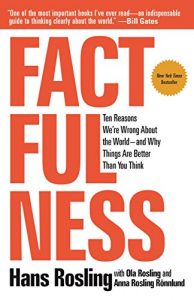Turn on the evening news, and you will be overwhelmed with the tragic events of the day:
- Terrorist attacks
- Horrific storms and natural disasters
- War, or the imminent threat of one
- Mass shootings
- School violence
- Kidnappings
- Animal attacks (e.g. sharks, bears, lions, etc.)
And the list goes on. It’s pretty easy to come to the conclusion that the world is a lot more dangerous, unsafe, and scarier than it’s ever been.
If you subscribe to the premise that the world is a more dangerous place, you should grab a copy of Factfulness by Hans Rosling. Rosling takes a measured, fact-based approach to show that the world is not as dangerous as the media would lead us to believe. Using numbers and statistics, he shows us that the world has never been a better and safer place than it is today.
I learned about Factfulness through Bill Gates blog. When Gates labels a book “one of the most educational books I’ve ever read,” it leads me to believe I should read it, too. Here’s is a video of Gates discussing the book, which provides a great overview
For me, Rosling challenged my views on vaccination rates, education levels, family size and world population growth, life expectancy, and global poverty rates. Here are just a few of the many key things I took away from the book:
- Sorting countries into developed and non-developed countries is an antiquated notion. This concept was introduced in the 1960’s to categorize the world. While the world has changed immensely since then, the categorization has not. As Rosling points out, you wouldn’t use a map from the 1960’s to explore the world, so why do we still use a broad categorization that was introduced over 50 years ago? Instead, Rosling contends that we should divide the world by levels of income, into four categories. It is a much better way to understand how the world and individual countries are evolving. Using his categorization makes it much clearer what types of resources, aid, and policies should be implemented to improve standards of living around the world.
- As the level of income grows in a country, the standard of living improves dramatically. There is better access to clean, drinkable water. More advanced modes of transportation are available. Methods of preparing (i.e. cooking) food changes. Availability of and access to food improves. In other words, the basic necessities of life get a lot better as income levels move from the lowest, level 1, to the best, level 4. The good news is that the vast majority of the world currently lives in levels 2 and 3, which is equivalent to standards of living in Western Europe and the United States in the 1950s. Better yet, their levels of income and standards of living are continually improving at a steady rate.
- Using facts and statistics provide a quantitative way to show how the world has improved, and it has improved a lot in the last 100 years. As just one example, eradication of many childhood diseases has drastically improved the percentage of people who live past five years old. It’s a key reason why birth rates are declining, especially in developing, excuse me, countries that are in level 2 and 3 for income. Furthermore, it is expected that birth rates will continue to decline, which is expected to lead to a plateau and possible decline of the world’s population during the second half of this century.
- The media generates their livelihood by catering to basic human fears. Rosling labels these as physical harm, captivity, and contamination. Most sensational stories exploit at least one of these fears, and some both (for example, airplane crashes cater to physical harm and captivity). It leads to a great quote in the book – “Fears that once helped keep our ancestors alive, today help keep journalists employed.”
While painting an optimistic view, Rosling rightfully points out that the world is not a perfect place today. It’s still in bad shape. We still have a lot of progress to make, even with all of the improvements he notes in the book. However, we’ve come a long way in the last 60 years, and the world is on a positive trajectory.
While we should celebrate the gains, we need to stay vigilant and mindful of the improvements that still need to be made. We cannot become callous to acts of violence, death, or climate issues. For example, when showing how annual infant deaths worldwide have been drastically reduced from 14.4 million in 1950 to 4.2 million in 2016, that it’s still a large number. Yes, it cause for celebration, but there’s still work to do.
The point Rosling is making is that we need to use facts to put issues into their proper perspective. It will allow us to make sure that our limited resources, which includes our attention in addition to time and money, is focused in the right places and not on the latest sensationalized event reported by the media.
Factfulness is one of the best, if not the best book I’ve read this year. Bill Gates’ statement about it being one of the most educational books you’ll read was not an exaggeration. It is easily and emphatically a Must Read book in my opinion. It should be at the top of your reading list for 2020. I would even go so far as to say that if you are going to read only one book in 2020, make that book Factfulness. You won’t regret it.

